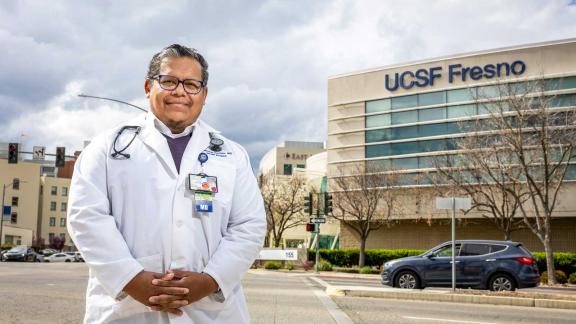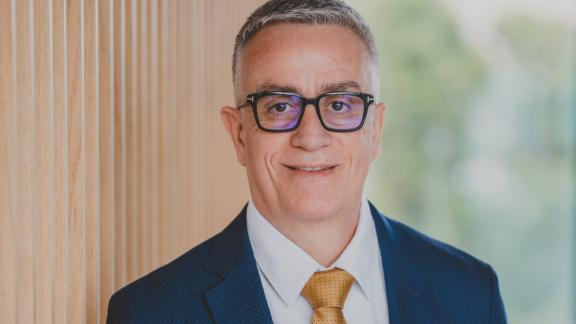FRESNO – Nine third-year UCSF medical students, including a graduate from the Doctors Academy, will spend the next several months in Fresno learning the skills necessary to become physicians and taking part in an innovative new program launched by UCSF Fresno.
The pilot program – Longitudinal Integrated Fresno Experience (LIFE) – represents a modern approach to medical education in which continuity is a defining feature. Working with underserved populations also is a key component.
LIFE differs from the traditional third-year clinical experience, in which medical students train in one specialty for four to six weeks and then move on to the next area of medicine. Students in the LIFE program cross-train simultaneously for six months in family and community medicine, internal medicine, neurology, and psychiatry. Each student is assigned to a practicing physician in each specialty who serves as a mentor during the course of the program. Students also engage in small-group learning projects on a weekly basis.
“The students experience an integrated curriculum, so they may go from psychiatry clinic on Monday to family medicine clinic on Tuesday,” said Christina Maser, MD, who along with Kenny V. Banh, MD, oversee the LIFE program as co-directors of Undergraduate Medical Education at UCSF Fresno. “They are exposed to underserved patient populations, and gain an appreciation for challenges that face healthcare providers who serve these populations.”
Clinical training will take place at Community Regional Medical Center, Clinica Sierra Vista in Fresno, Selma Community Health Center, VA Central California Health Care System, and UCSF Fresno faculty private practice locations.
Sunnyside High School, an academic preparation program run by UCSF Fresno for high school students interested in the health professions.
“I chose the LIFE program because it offered me an opportunity to come home to learn and serve the community in which I grew up,” said Singh. The people in the greater Fresno area mean a lot to me and I wanted to give back in some way. I thought it would also be a good way to integrate my learning by combining many different disciplines into a six-month rotation.”
Five of the nine students are from underrepresented ethnic backgrounds.
“Bringing medical students to the Fresno area has numerous benefits,” said Michael Peterson, MD, chief of medicine at UCSF Fresno. “Under the supervision of exceptional faculty members, they contribute to patient care, but equally important, many medical students who conduct rotations at UCSF Fresno go on to complete their residency or other training program here. And we know that doctors who train here are more likely to stay to provide care.”
Producing an adequate number of primary care physicians, training physicians committed to practicing in underserved areas and increasing the number of minority physicians are issues of particular importance for medical schools, according to a recent article in the Annals of Internal Medicine, The Social Mission of Medical Education: Ranking the Schools. UCSF Fresno is a clinical educational branch of the UCSF School of Medicine. Thirty to 50 percent of the medical residents who train at UCSF Fresno stay in the area to provide care.
UCSF Fresno Medical Education Program, established more than 35 years ago, plays a substantial role in providing healthcare services to residents of California's San Joaquin Valley and training medical professionals in the region. The medical education program has trained approximately one- third of Central San Joaquin Valley physicians. UCSF Fresno currently trains approximately 250 medical residents in nine specialties, more than 30 fellows in 12 subspecialties and about 200 medical students on a rotating basis.
UCSF Fresno faculty and medical residents engage in a broad spectrum of research addressing health issues pertinent to the Valley. UCSF Fresno faculty and residents also care for the overwhelming majority of the region’s underserved populations. In addition, UCSF Fresno provides academic preparation programs for middle- and high school students interested in the health professions through the Doctors Academy and Junior Doctors Academy. UCSF Fresno is a key partner in UC Merced's planned School of Medicine and is expected to play a significant role in the training of medical students at the school.
UCSF is a leading university dedicated to promoting health worldwide through advanced biomedical research, graduate-level education in the life sciences and health professions, and excellence in patient care. For further information, visit http://www.ucsf.edu.
“Students in the LIFE program are able to see patient progression much like a practicing physician does,” said Banh. “LIFE students follow patients for a longer period of time. They go to medical appointments with patients and they learn how one area of medicine impacts another.”
All nine students chose to take part in the unique learning opportunity. One student, Nathan Singh, is originally from Fresno and is a 2004 graduate from the Doctors Academy at





